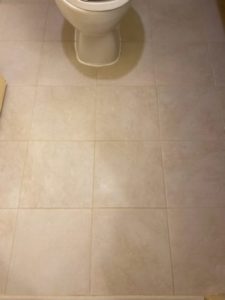Jump To:
- What is grout made out of?
- Why does grout crack and crumble between tiles?
- Advantages of repairing bathroom tile grout in your facility
- Why do I need professional grout cleaning, repair, and restoration?
- How does Mid America address grout issues?
Grout does much more than just hold tiles together – it enhances aesthetic value and prevents moisture from seeping in between tiles. If you’re a business owner and you’re wondering how to fix a bad grout job, or you’re thinking you can simply patch grout as a quick DIY fix, grout repair is not something you should haphazardly go about with a quick trip to Lowe’s or Home Depot. Grout crack repair should be done professionally.
But why should you consider professional grout repair? To answer this question, it’s important to know the answer to an even more fundamental question: what is grout made from? Knowing the chemical composition of grout is necessary for addressing issues that sometimes happen, for instance, when grout cracks and needs repair. Continue reading Mid America Specialty Services’ informative guide to learn more about grout cleaning, cracking, repairing, and maintenance.
All About Grout: What Is Grout Made From?
Traditionally made from a mixture of cement, water, sand and chemicals, grout fills the gaps between tiles. Both non-toxic and non-flammable, it binds the structure together while absorbing vibrations and other impacts. It plays a role in waterproofing and is useful for repairing cracks. Grout is generally considered to be more aesthetically pleasing than cement. The type of grout used on a particular surface will affect maintenance requirements. Two common types of grout are cementitious and epoxy.
Cementitious Grout
Considered to be a traditional grouting material, cementitious grouts include a mix of Portland cement, filler particles and water-retentive additives. Pigments can be added to produce grout in a range of colors. Cementitious grout is porous and vulnerable to staining, so sealing may be required. Cementitious grouts can be either sanded or unsanded. Sanded grout contains large sand particles, which gives the surface a gritty feel. It is typically used when seams between tiles are ⅛ inch or greater. Unsanded grout has finer particles for a smoother texture and is mostly found in thinner seams of 1/16 to ⅛ inch wide.
Epoxy Grout
Epoxy grouts are made with resin, silica fibers and hardener, with pigments added for color. Epoxy is less porous than cementitious grout and usually doesn’t require sealing. It is an ideal material for areas exposed to moisture, grease, acids and other contaminants. While most epoxy grouts contain no Portland cement, a modified epoxy can be mixed with cement to yield a harder, stronger end product.
Sources of Grout Cracking & Crumbling Between Tiles
Unfortunately, issues like hairline fractures and crumbling can arise after applying grout in between tiles, especially in high-moisture areas such as bathrooms and kitchens. As mentioned before, cementitious grout is a type that benefits from being sealed. However, if cementitious grout is not sealed properly, issues can start to develop quickly after the grout is dried and settled.
If cementitious grout is incorrectly or incompletely applied in between tile seams, that could also cause disturbances during the drying and curing process. If you are experiencing grout cracking after recently being installed, it is important to remediate the issue as fast as possible.
Considering Grout Cleaning & Repair in Your Facility’s Bathrooms
People are paying even greater attention to cleanliness these days, and bathrooms in particular can make or break the customer experience. Floors and adjacent surfaces in public restrooms need extra attention, as they build up grime in higher volume and at a faster rate than other areas. Regular maintenance keeps grout cleaner longer and may extend the lifespan of a floor surface. “Replacement of commercial grout is a nightmare,” Smith notes, “so the goal is to keep from having to do this.” Getting rid of dirt and tracked-in contaminants limits wear and tear and improves appearance. In addition, killing harmful bacteria means a healthier place of business for employees and customers.
Why Your Facility Needs Ceramic Tile Grout Cleaning, Repair, & Restoration


Your facility needs regular ceramic tile grout cleaning and restoration because dirt and stains become harder to remove when routine grout cleaning is neglected. Investing in regular maintenance cuts down on more expensive repair and replacement costs in the long run. George Smith points out that typical janitorial services contribute to wear on grout. While frequent mopping of restrooms and other areas are necessary and common, the process is of limited benefit, as it spreads dirt into the grout. Contaminants build up over time, giving the grout a dull and dirty appearance.
Trained Professional Grout Cleaning Services
On top of that, improper care methods can lead to permanent damage and discoloration. Professional grout refinishing gets rid of deeply embedded debris. Trained refinishers remove stains from hard-to-reach areas and restore the grout to its original appearance. Smith says three important processes differentiate the grout services MASS provides:
- Low-volatile-organic-compound (VOC), non-acidic chemicals that won’t damage the grout and surrounding finishes
- Hot water
- Extraction of dirty water and cleaning solutions from the grout
Professional grout services are very affordable and mostly performed at night, with no need to close down restrooms to tenants. If required, a grout sealer can be applied to protect the surface and make routine cleaning easier. However, many commercial grouts don’t need a sealer, so this step is not always needed.
Day-to-Day Grout Care from Mid America Specialty Services
As noted above, regular grout refinishing can extend the service life of the material and facilitate easier cleaning. Nightly janitorial staff should use only neutral cleaners to avoid damage to the grout. Frequent mop water changes are necessary to keep from spreading the dirt around and ensure that the floor actually gets cleaned. Besides restrooms, grout refinishing can improve the appearance of other interior areas, including entryways, walkways, conference rooms and hotel guest rooms.
At MASS, our technicians complete extensive training in the proper grout refinishing methods. We select quality cleaning products that safely remove contaminants without damaging the grout or adjacent materials. We help clients maintain an attractive building appearance and maintain a safe, healthy indoor environment. If you need more information on grout services, please contact us to speak with one of our experts.